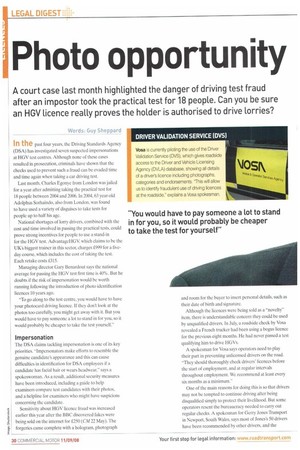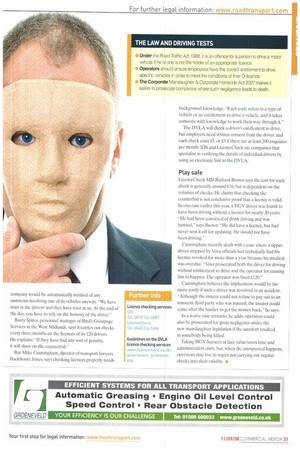1 LEGAL DIGEST Photo opportunity A court case last month highlighted the danger of driving test fraud
Page 30

Page 31

If you've noticed an error in this article please click here to report it so we can fix it.
after an impostor took the practical test for 18 people. Can you be sure an HGV licence really proves the holder is authorised to drive lorries?
Words: Guy Sheppard In the past four years, the Driving Standards Agency (DSA) has investigated seven suspected impersonations at HGV test centres. Although none of these cases resulted in prosecution, criminals have shown that the checks used to prevent such a fraud can be evaded time and time again when taking a car driving test.
Last month, Charles Egonye from London was jailed for a year after admitting taking the practical test for 18 people between 2004 and 2006. In 2004,63 year-old Adolphus Sorhaindo, also from London, was found to have used a variety of disguises to take tests for people up to half his age.
National shortages of lorry drivers, combined with the cost and time involved in passing the practical tests, could prove strong incentives for people to use a stand-in for the HGV test. AdvantageHGV which claims to be the UK's biggest trainer in this sector, charges £999 for a fiveday course, which includes the cost of taking the test. Each retake costs £315.
Managing director Gary Benardout says the national average for passing the HGV test first time is 40%. But he doubts if the risk of impersonation would be worth running following the introduction of photo identification licences 10 years ago.
"To go along to the test centre, you would have to have your photocard driving licence. If they don't look at the photos too carefully, you might get away with it. But you would have to pay someone a lot to stand in for you, so it would probably be cheaper to take the test yourself."
Impersonation
The DSA claims tackling impersonation is one of its key priorities. "Impersonators make efforts to resemble the genuine candidate's appearance and this can cause difficulties in identification for DSA employees if a candidate has facial hair or wears headwear," says a spokeswoman. As a result, additional security measures have been introduced, including a guide to help examiners compare test candidates with their photos, and a helpline for examiners who might have suspicions concerning the candidate.
Sensitivity about HGV licence fraud was increased earlier this year after the BBC discovered fakes were being sold on the internet for £250 (CM 22 May). The forgeries came complete with a hologram. photograph and room for the buyer to insert personal details, such as their date of birth and signature.
Although the licences were being sold as a "novelty" item, there is understandable concern they could be used by unqualified drivers. In July, a roadside check by Vosa revealed a French trucker had been using a bogus licence for the previous eight months. He had never passed a test qualifying him to drive HGVs.
A spokesman for Vosa says operators need to play their part in preventing unlicensed drivers on the road. -They should thoroughly check drivers' licences before the start of employment, and at regular intervals throughout employment. We recommend at least every six months as a minimum."
One of the main reasons for doing this is so that drivers may not be tempted to continue driving after being disqualified simply to protect their livelihood. But some operators resent the bureaucracy needed to carry out regular checks. A spokesman for Gerry Jones Transport in Newport, South Wales, says most of Jones's 50 drivers have been recommended by other drivers, and the company would be automatically notified of any summons involving one of its vehicles anyway. "We have trust in the drivers and they have trust in us. At the end of the day, you have to rely on the honesty of the driver."
Barry Spires, personnel manager of Bird's Groupage Services in the West Midlands, says it carries out checks every three months on the licences of its 120 drivers. He explains: "If they have had any sort of penalty, it will show on the counterfoil."
But Mike Cunningham, director of transport lawyers Backhouse Jones. says checking licences properly needs background knowledge. -Each code refers to a type of vehicle or an entitlement to drive a vehicle, and it takes someone with knowledge to work their way through it."
The DVLA will check a driver's entitlement to drive, but employers need written consent from the driver, and each check costs £5, or E3 if there are at least 200 enquiries per month. IDS and LicenceCheck are companies that specialise in verifying the details of individual drivers by using an electronic link to the DVLA.
Play safe
LicenceCheck MD Richard Brown says the cost for each check is generally around £1 0, but is dependent on the volumes of checks. He claims that checking the counterfoil is not conclusive proof that a licence is valid. In one case earlier this year, a HCiV driver was found to have been driving without a licence for nearly 30 years. 'He had been convicted of drink driving and was banned," says Brown. "He did have a licence, but had never sent it off for updating. He should not have been driving."
Cunningham recently dealt with a case where a tipper driver stopped by Vosa officials had technically had his licence revoked for more than a year because his medical was overdue. -Vosa prosecuted both the driver for driving without entitlement to drive and the operator for causing this to happen. The operator was fined £120."
Cunningham believes the implications would be far more costly if such a driver was involved in an accident. "Although the insurer could not refuse to pay out to an innocent third party who was injured, the insurer could come after the haulier to get the money back," he says.
In a worse case scenario, he adds, operators could also be prosecuted for gross negligence under the new manslaughter legislation if the accident resulted in somebody being killed.
Taking HGV licences at face value saves time and administration costs, but, when the unexpected happens, operators may live to regret not carrying out regular checks into their validity. •












































































































































































